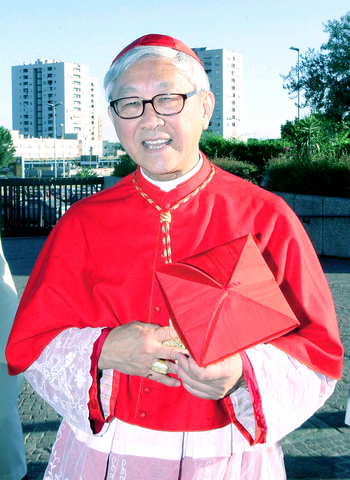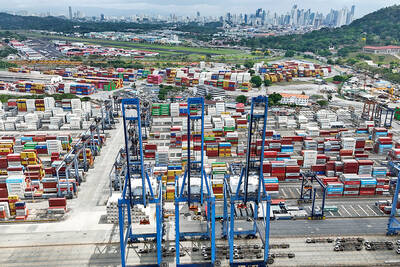Mass had scarcely ended on June 4 when a gaggle of young women flocked to the front of the cathedral. Groups of them took turns having their photos taken with the thin, silver-haired 74-year-old who so captured their fancy: Cardinal Joseph Zen Zi-kiun (
He smiled gently for the photos, then walked across an alley to an indoor basketball court with a concrete floor and rusty fans on the walls that barely stirred the warm, humid air. After a youth group had sung religious songs, and after a slide show depicting the Chinese military crackdown in Tiananmen Square on June 4, 1989, he read a strongly worded message calling for residents of Hong Kong to remember their countrymen elsewhere in China.
"The young people who fought and died for democracy in Tiananmen Square were their brothers and sisters," he said in the speech. "After June 4, we can no longer fight selfishly just to win the most rights for Hong Kong."

PHOTO: EPA
With his charisma, erudition and dedication to human rights, Zen has become a celebrity here, a man wielding considerable political influence as well as religious power. But his high profile and growing influence have antagonized senior officials in mainland China, particularly those who oversee the state-controlled church.
His elevation to cardinal in February was called "a hostile act" by Liu Bainian (
"Unfortunately, the Vatican listened to irresponsible suggestions by a clergyman in Hong Kong and issued a severe condemnation" of the appointments, Ye Xiaowen (葉小文), the director of the State Administration for Religious Affairs, said in an interview.
Zen said that some Chinese government officials saw him as siding with the Vatican against his country.
He described that as "a really foolish way of thinking," adding: "I may also contribute to the Chinese side because I can explain to them what is the normal operation of a church in China or elsewhere, to free them from many fears they have against the Church."
Zen has legions of defenders in the West, and even some on in China. China's Confucian tradition, never stamped out under communism, confers high status on scholars, and Zen is widely admired as a thoughtful, soft-spoken man who speaks several Chinese dialects in addition to fluent English, Italian and Latin.
Lu Xinhua (
Zen grew up in a poor area of Shanghai, where as a boy he enjoyed family trips to a Salesian church atop a hill on the city's outskirts.
"That holy shrine is really an attraction, and so when we were children it was a big event to be able to go on pilgrimage" there, he recalled in an interview.
The family, never well off, fell into poverty after the Japanese capture of Shanghai in 1937. His father first lost his job doing technical drawings and then had a stroke that left him paralyzed. But Zen pursued his education, for free, with the Salesian order, and went to Hong Kong and then Turin, Italy, to study for the priesthood.
Like many here, he watched with fascination and then horror as the democracy protests unfolded in Beijing in the spring of 1989. The killings of protesters in and around Tiananmen Square was a turning point in his life, he said, motivating him to spend the next seven years traveling to mainland seminaries to teach.
"This force supported me from 1989 to 1996 to spend half of my life in China nurturing people who can work for the church and become shepherds of the church in China," he said in his speech on June 4 this year.
Zen kept fairly quiet about his own political views during those years, as he developed close friendships in Beijing, Shanghai and elsewhere with many priests and bishops in both the government-supervised churches and the "underground." The underground churches are closely watched by the police and face levels of persecution that vary widely among provinces.
It was after Zen became Hong Kong's junior bishop, in 1996, that he began to develop a reputation for strong comments about civil liberties. But he became much more outspoken after September 2002, when he took over the Hong Kong diocese. He soon emerged as a leader in the successful campaign to block the imposition of stringent internal security regulations here, an effort that brought 500,000 people into the streets on July 1, 2003.
Zen is frequently criticized for campaigning for greater democracy in Hong Kong but opposing elections for church leaders. He denies that this poses a contradiction.
"The faith community is a free community, so you may join and you may not join," he said. "You must be a member of a state, a nation, and then, there, you must have your rights to be one of the community, and to defend your own rights -- you must have a voice."
There has been speculation that Zen might be summoned to Rome, but the cardinal has a longer-term ambition: to return to the city of his youth as a teacher of priests, ideally living at a seminary that has a view of the shrine he used to visit as a boy.

THE TRAGEDY OF PUNCH: Footage of the seven-month-old Japanese macaque has gone viral online after he was rejected by his mother and formed a bond with a soft toy A baby monkey in Japan has captured hearts around the world after videos of him being bullied by other monkeys and rejected by his mother went viral last week. Punch, a Japanese macaque, was born in July last year at Ichikawa City Zoo. He has drawn international attention after zookeepers gave him a stuffed orangutan toy after he was abandoned by his mother. Without maternal guidance to help him integrate, Punch has turned to the toy for comfort. He has been filmed multiple times being dragged and chased by older Japanese macaques inside the enclosure. Early clips showed him wandering alone with

Australian Prime Minister Anthony Albanese yesterday said he did not take his security for granted, after he was evacuated from his residence for several hours following a bomb threat sent to a Chinese dance group. Albanese was evacuated from his Canberra residence late on Tuesday following the threat, and returned a few hours later after nothing suspicious was found. The bomb scare was among several e-mails threatening Albanese sent to a representative of Shen Yun, a classical Chinese dance troupe banned in China that is due to perform in Australia this month, a spokesperson for the group said in a statement. The e-mail

TENSIONS: The march went ahead without clashes, but arrests were still possible as police investigate suspects behind Nazi salutes, racist slurs and homophobic insults Thousands of people on Saturday marched in southeastern France under heavy security in tribute to a far-right activist whose killing, blamed on the hard left, has put the country on edge. The crowd — many wearing black and some covering their lower faces with masks — marched through the city of Lyon carrying flowers and placards bearing pictures of Quentin Deranque and the words: “justice for Quentin” and “the extreme left kills.” The 23-year-old died from head injuries following clashes between radical left and far-right supporters on the sidelines of a demonstration against a politician from the left-wing France Unbowed

‘OCCUPATION’: Hong Kong said it had lodged ‘stern protests’ with Panama’s consulate, and would ‘staunchly support’ the rights and interests of Hong Kong companies Panamanian President Jose Raul Mulino on Monday ordered the temporary occupation of two ports run by a unit of CK Hutchison Holdings Ltd following the Supreme Court’s ruling against the firm’s concession, escalating a dispute that has become a proxy battle between the US and China in Latin America. Mulino said in a speech that the administration and operation of the two ports on the strategic Panama Canal is to revert to the country’s National Maritime Authority to ensure their uninterrupted, safe and efficient operation. The occupation covers movable equipment at the ports and does not mean a definitive loss of